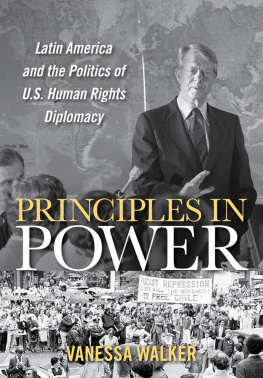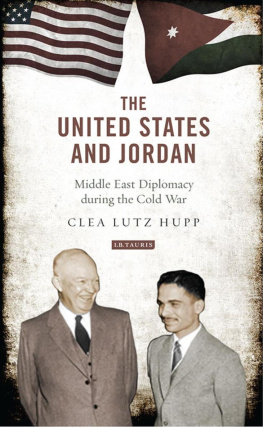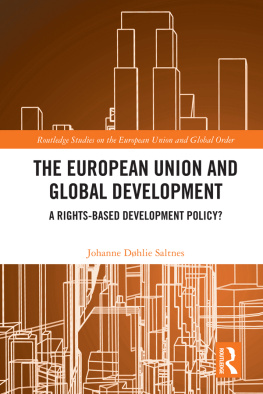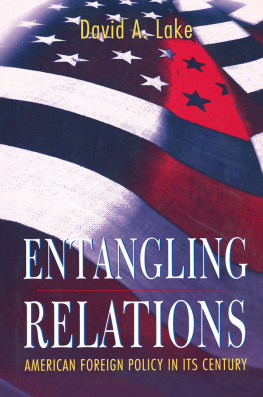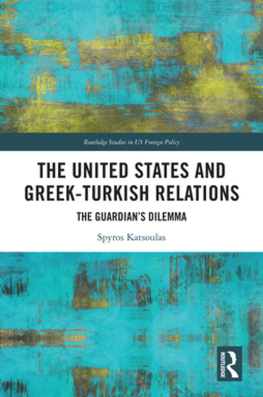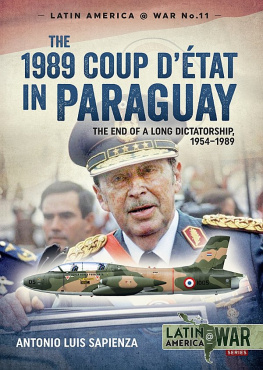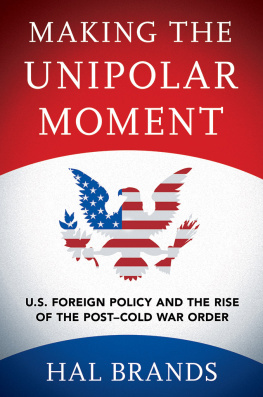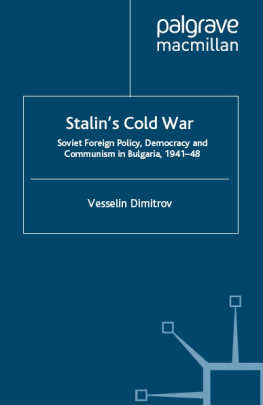PITT LATIN AMERICAN SERIES
John Charles Chasteen and Catherine M. Conaghan, Editors
Published by the University of Pittsburgh Press, Pittsburgh, Pa., 15260
Copyright 2019, University of Pittsburgh Press
All rights reserved
Manufactured in the United States of America
Printed on acid-free paper
10 9 8 7 6 5 4 3 2 1
Cataloging-in-Publication data is available from the Library of Congress
ISBN 13: 978-0-8229-6573-2
ISBN 10: 0-8229-6573-9
Cover design: Melissa Dias-Mandoly
ISBN-13: 978-0-8229-8650-8 (electronic)
For Anne, Lillian, and Grace
ACKNOWLEDGMENTS
Well before the polished prose comes the sifting and sorting of archival sources and documents. Without exception, archivists and librarians at each of the repositories cited provided crucial assistance in identifying and accessing the research material underpinning this book. For their mentoring, professionalism, and support from the very beginning, I am indebted to Joan Hoff, Alonzo Hamby, Chester Pach, and Harold Molineu. Other historians and scholars generously offered friendly critiques and good advice along the way. I thank Philip Muehlenbeck, Hal Brands, Marc Selverstone, Lus Nuno Rodrigues, Ariel Armony, and Andrew Nickson.
This book has further benefited from conversations with many friends at the University of WisconsinMilwaukee at Washington County and the University of Wisconsin Colleges history department. In particular, I am grateful to Jeff Leigh and Michael D. Jacobs for the opportunity to share ideas about our own different scholarly projects during our summer sojourns to Colorado and Utah.
One of the greatest pleasures in working on this book was the opportunity to spend time in Asuncin. Thanks to the efforts of Daniel Asad and Israel Ko, I learned the importance of tranquilo pa and rooting for Club Olimpia. Through Daniel and Israel, furthermore, I had a chance encounter (at an Irish pub featuring a cover band playing Bon Jovi and Poison, no less) with Susana Faria and Adolfo Patio. It must have been fate. They both took time away from their own busy schedules to guide me through the citys rich historical and cultural heritage, culminating in an incredible road trip to Aregu. I will never forget the sumptuous asado shared with Susis and Patos extended family, including Joao Carlos Bez Villalba and Olga Merlo. I thank them all for their extraordinary generosity and friendship.
At the University of Pittsburgh Press, I had the good fortune of working with senior acquisitions editor Josh Shanholtzer, who expertly guided this book to completion. Thanks, too, to Alex Wolfe and the editorial staff for their attention to detail. Several outside readers at the press provided excellent feedback and crucial revisions; any remaining mistakes or errors of omission are mine alone.
While those identified previously provided much-needed assistance with research and writing, other friends and family provided much-needed succor, particularly when my efforts to complete this project too closely resembled Sisyphuss. I have gained much wisdom and mirth over many years from Paul Chastko, Kevin OConnor, Scott Beekman and Kim Little, Rick Dodgson and Alex Liosatos, Bill Kamil and Michelle Sampson, fellow members of the DK music collective, and fellow patrons at Randys on the Lake.
My late parents, Les and Sharon Tyvela, instilled in me an intellectual curiosity of the world and a passion for storytelling. They would have been thrilled to read these words. My in-laws, Harold and Connie Molineu, have been unwavering sources of encouragement. Finally, the completion of this book would have been impossible without the steadfast support of my wife, Anne Molineu, and the joys provided by our young daughters, Lillian and Grace. Their love and inspiration have served as a welcome reminder that the most important parts of life take place off-screen and beyond the printed page.
Introduction
WHO SPEAKS FOR JOELITO?
The Dilemmas of U.S. Power in the World
Joelito Filrtiga had little time to comprehend the sheer brutality inflicted upon his body. On March 29, 1976, the seventeen-year-old Paraguayan was kidnapped from his home in Asuncin by members of a death squad led by Amrico Pea-Irala, a police official in that nations capital. He was taken to a nearby comisara, one in a vast network of police stations routinely used by the Alfredo Stroessner regime (19541989) to detain and interrogate political prisoners. It was there that the young man was tortured for approximately two hours, abating only when he died after suffering cardiac arrest. An independent autopsy of Joelitos mutilated corpse later revealed multiple bruises, stab wounds, and burns typically associated with the picana, an electrified device used by government officials to sear the flesh of dissidents.
By any standard, his death was a tragedy. It also manifestly violated universal norms of human rights established in 1948 by the United Nations (Universal Declaration of Human Rights) and the Organization of American States (American Declaration of the Rights and Duties of Man), which the U.S. government since that time has pledged to uphold and enforce. Yet at the moment of the Filrtiga murder, U.S. officials had supported the Paraguayan regime responsible for that heinous act for more than twenty years. Having established in 1954 a good partnership rooted in mutual opposition to communism, the United States and Alfredo Stroessner proceeded to forge a close diplomatic relationship
To be sure, the murder of Joelito Filrtiga was plotted and carried out solely by Paraguayan hands. But many officials and policy analysts in Washington implicitly accepted such flagrant abuses as an acceptable level of collateral damage given the high stakes of the global Cold War. While lamentable, they would likely acknowledge his example, and perhaps many more were nonetheless necessary to ensure the political stability of allies who provided security through anticommunism, thus enhancing U.S. power in Latin America and throughout the world. The national interest of the United States demanded as much, as then Secretary of State Henry Kissinger explained to his staff in October 1974: all the other stuff is sentimental nonsense.
DILEMMAS AND DICTATORS
But through its reliance on authoritarian regimes to promote those interests, the United States was sharply at odds with its own rhetoric regarding the expansion of the nations self-defined democratic mission in the world. The process by which officials in Washington made bilateral policy decisions toward Paraguay during the Cold War brought out in stark relief a persistent theme that has defined the nations diplomacy for more than a centurythe dictator dilemma. The overall argument of this book is that the Stroessner regime was symbolic of a broader foreign policy struggle to perpetuate, enforce, and ultimately redefine the importance of friendly dictators to U.S. foreign policy interests. Political leaders in the United States since its founding have repeatedly characterized the nation as an exemplar of individual liberty and freedom, values presumed to be both uniquely embedded within its own historical experience and universal in their appeal to others.
Rooted in John Winthrops evocation in 1630 of his Puritan colony as an exemplary city upon a hill, this belief suffused the long history of continental, hemispheric, and latterly global expansion by the United States. Echoes of
This belief in the exceptional purpose of the United States power grew exponentially with the onset of the Cold War. So did the fear, as demonstrated by the Truman Doctrine, that the spread of Soviet communism would abort that mission. One of the primary objectives of the foreign policy of the United States, stated Harry Truman before a joint session of Congress on March 12, 1947, is the creation of conditions in which we and other nations will be able to work out a way of life free from coercion.


